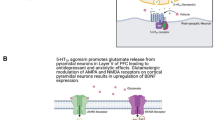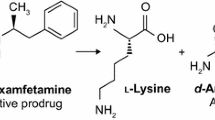Heading
Abstract
Rationale. The differential reinforcement of low-rate 72-s (DRL 72-s) schedule, in which rats must withhold a response for at least 72 s to obtain a reward (generally water), is an attractive procedure for the characterisation of potential antidepressant agents. Indeed, several antidepressants have been shown to improve efficiency (ratio of reinforcement rate to response rate) in this model, either by decreasing response rates and/or by increasing reinforcement rates.
Objective. Herein, we compared the actions of antidepressants known to inhibit serotonin (5-HT), norepinephrine (NE) and/or dopamine (DA) reuptake in a food-rewarded DRL 72-s schedule.
Methods. Rats trained in a food-rewarded DRL 72-s schedule and showing stable baseline performance were administered with drugs i.p. once a week. In independent experiments, the influence of drugs on food intake, spontaneous locomotor activity and extracellular levels of monoamines in the frontal cortex was evaluated.
Results. In confirmation of previous studies, the tricyclic agent imipramine (10.0 mg/kg) and the "atypical" agent mianserin (40.0 mg/kg) significantly increased efficiency. In analogy, the selective NE reuptake inhibitors (NARIs) desipramine (20.0 mg/kg), nortriptyline (2.5 mg/kg) and reboxetine (0.63 mg/kg) all displayed marked enhancements in efficiency. In contrast, the selective 5-HT reuptake inhibitors (SSRIs) citalopram (10.0 mg/kg), fluvoxamine (10.0 mg/kg) and paroxetine (10.0 mg/kg) all significantly decreased efficiency. The mixed 5-HT/NE reuptake inhibitors (SNRIs) venlafaxine (2.5 mg/kg, 10.0 mg/kg) and S33005 (0.16–10.0 mg/kg), likewise, did not increase efficiency. Further, the DA reuptake inhibitors (DARIs) bupropion (0.16–10.0 mg/kg) and GBR12935 (0.63–10.0 mg/kg) had no effect on DRL 72-s performance. All drug classes exerted a similar, mild inhibitory influence on food intake and locomotor behaviour. Imipramine, mianserin and NARIs markedly increased extracellular levels of NE, and SSRIs elevated levels of 5-HT, while SSRIs augmented levels of both.
Conclusions. The present experimental procedure demonstrates, in analogy to imipramine and mianserin, robust and consistent increases in efficiency with NARIs. Their effects may be distinguished from a decrease in efficiency elicited by SSRIs, and a lack of activity of SNRIs and DARIs. While the reasons underlying the ineffectiveness of SSRIs (in contrast to previous studies) remain to be clarified, these data underline the importance of adrenergic mechanisms in the control of behaviour under conditions of delayed responding. Further, they support the interest of DRL 72-s procedures for the characterisation of diverse classes of antidepressant agent.
Similar content being viewed by others
Author information
Authors and Affiliations
Additional information
Electronic Publication
Rights and permissions
About this article
Cite this article
Dekeyne, A., Gobert, A., Auclair, A. et al. Differential modulation of efficiency in a food-rewarded "differential reinforcement of low-rate" 72-s schedule in rats by norepinephrine and serotonin reuptake inhibitors. Psychopharmacology 162, 156–167 (2002). https://doi.org/10.1007/s00213-002-1070-x
Received:
Accepted:
Published:
Issue Date:
DOI: https://doi.org/10.1007/s00213-002-1070-x




